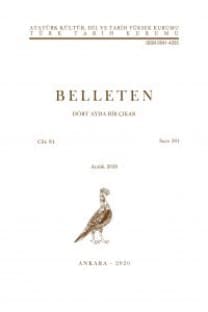IX. Türk Tarih Kongresi
Türkiye Cumhuriyeti'nin ve Türk Tarih Kurumu'nun kurucusu Mustafa Kemal Atatürk'ün Doğumunun 100. Yıldönümü dolayısıyla düzenlenen IX. Türk Tarih Kongresi 21-25 Eylül 1981 tarihleri arasında, Devlet Başkanı Orgeneral Sayın Kenan Evren'in koruyucu başkanlığında Ankara'da toplandı. Hazırlık çalışmalarına birbuçuk yıl önce başlanan Kongre'ye sunulacak bildirilerde Atatürk ve Türk Devrimi ile ilgili araştırmalar ile Atatürk'ün gösterdiği yolda, Türklerin ve Türkiye'nin tarihini aydınlatacak araştırmaların yoğunluk kazanması öngörülmekteydi. Eski Anadolu ve Çevresi Uygarlıkları, Orta Asya ve Ortaçağ Türk Tarihi ve Türkiye Tarihi, Osmanlı Tarihi ile Atatürk ve Devrimlerini konu alan Kongre'ye, yurt içinden ve yurt dışından 500 dolayında bilim adamı katılmıştır.
Anahtar Kelimeler:
Türkiye Cumhuriyeti, Türk Tarih Kurumu, IX. Türk Tarih Kongresi, Mustafa Kemal Atatürk
A Proposal for Research on Indo - Turkish Relations
Interchange between India and Turkish world is older than Islam and there is little doubt that Indians and Turks during the Hittite period have several common religious concepts and even political contacts. It is generally believed that the first contact of the Turks took place with the compaigns of Mahmud Ghaznavi in India in the first decades of the II th. century A. D. but in fact India came into direct contact with the Turks through Turkish states first established on Indian soil in the first century B. C. long before the advent of Muslims in India. This was the first phase of Indo-Turkish relations which ended with the fail of the Turk Shahi dynasty. Later on in the second century of Christian era a famous Turk ruler emerged in India and made his way to the glory and renown. He is known as Kanishka (120-162 A. D.). Warahmehra, in his well-known Sanskrit work of Rajtrangi, describes the emperor Kanishka and his successors as belonging to Turushka family. The details of description of this emperor available to us, positively point to the fact that Kanishka belonged to Turkish race and not to Mongols. His coins bears the title of "Shaunanushah" which is a Turkish word.
Keywords:
Indo-Turkish India, Turkey, Kanishka, Sanskrit,
- ISSN: 0041-4255
- Yayın Aralığı: Yılda 3 Sayı
- Başlangıç: 1937
- Yayıncı: Türk Tarih Kurumu
Sayıdaki Diğer Makaleler
1933 Yılından Sonra Alman Bilim Adamlarının Türkiye'ye Göçü
Prof. M. Tayyib Gökbilgin (1907-1981)
Anadolu Selçukluları Devrinde Anadolu Bacıları (Baciyan-i Rum) Örgütünün Kurucusu Fatma Bacı Kimdir?
Mustafa Kemal Hakkında Düşürülen Tarihler ve Bunların Edebi, Tarihi Değeri
Atatürk'te Namık Kemal'in Etkisi ve Abdülhamit Döneminde Yasak Kitaplara İlişkin İki Belge
